Art is everywhere — from paintings and sculptures to dance and music, in clothing, perfumes, and cuisine. It defines and shapes our sense of place, in architecture, green spaces, furniture, and decorations.ĚýĚý
At ±«Óătv, you don’t need to go far to find all of the above.
To celebrate National Indigenous History Month — a time to recognize the rich history, heritage, resilience and diversity of First Nations, Inuit and MĂ©tis — this self-guided walking tour will guide you around some of the campus buildings and spaces that pay tribute to Indigenous artists, ceremonies, and stories.Ěý
In Halifax
Starting at the Henry Hicks Building.
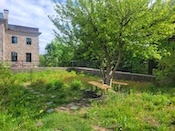 Stop #1: Pollinator Garden outside the Henry Hicks Building
Stop #1: Pollinator Garden outside the Henry Hicks Building
6283 Alumni Crescent
Designed by guest curator Frances Dorsey, in consultation with Mi’kmaq artist and scholar Michelle Syllliboy, the garden centres around an ancient Mi’kmaq glyph (a symbol or readable character) that means “Listen to us.”
The garden also features two commissioned benches by Jim and Cheryl Walsh, installed at ±«Óătv's 2023 Mawio'mi.Ěý
Learn more:ĚýIndigenous pollinator garden honours community figure while adding natural appeal to Dal campus
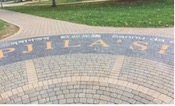 Stop #2: Welcome Circle on the Studley Quad
Stop #2: Welcome Circle on the Studley Quad
Painted in 2019, the Welcome Circle is part of a broader project and legacy for Dal’s 200th anniversary. The circle was repainted in 2023 ahead of the North American Indigenous Games.
Ěý
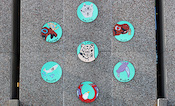 Stop #3: Sacred Teachings outside the Killam Library
Stop #3: Sacred Teachings outside the Killam Library
6225 University Avenue
Created by Millbrook artistĚý, known by his Mi’kmaw name, “Warrior on the Hill," the circular paintings symbolize the Seven Sacred Teachings of the Mi’kmaq or L’nu’k.
On Dal News: Sacred Teachings showcased in new public art on Killam Library
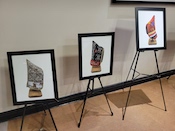 Stop #4: Peaked Hats exhibit at the Killam Library
Stop #4: Peaked Hats exhibit at the Killam Library
6225 University Avenue,ĚýKo’jua Okuom, first floor
An exhibit from Wapna’kikewi’skwaq ~ Women of First Light, the Peaked Hats were created family members of Missing and Murdered Indigenous Women and Girls.
Ěý
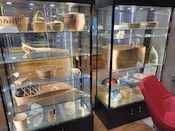 Stop #5: Collection at the Killam Library
Stop #5: Collection at the Killam Library
6225 University Avenue,ĚýKo’jua Okuom, first floor
Catherine Martin, director of Indigenous community engagement at ±«Óătv University, has generously loaned three display cases of pieces from her personal collection.
Ěý
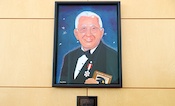 Stop #6: Portrait of Elder Daniel Paul in the Marion McCain Building
Stop #6: Portrait of Elder Daniel Paul in the Marion McCain Building
6135 University Avenue, first floor lobby
Painted by Alan Syliboy, commissioned by faculty and staff in the Faculty of Arts and Social Sciences with support from the Office of Advancement and a campaign through Project Dal.Ěý
On Dal News: Influential Mi’kmaw historian honoured with special Dal‑commissioned portrait
On Dal News:ĚýFriends, family and community gather to honour the late Elder Daniel Paul
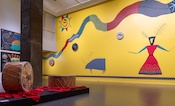 Stop #7: The Journey so Far exhibition at the Dal Art Gallery
Stop #7: The Journey so Far exhibition at the Dal Art Gallery
6101 University Avenue, downstairs
Curated by Pamela Edmonds, this survey exhibition (on display from May 9 to August 11) unveils the extraordinary creative odyssey of artist Alan Syliboy, born and raised on Millbrook First Nation.Ěý
On Dal News:ĚýAlan Syliboy exhibition offers 50‑year retrospective on one of the region's defining artists
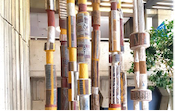 Stop #8: Tutini inside the Dal Art Gallery atrium
Stop #8: Tutini inside the Dal Art Gallery atrium
6101 University Ave, atrium
Tutini is a contemporary representation of carved burial poles sacred to the Indigenous peoples of Australia's Tiwi Islands installed in theĚý±«Óătv Art Centre's Sculpture Court in 1974.
Ěý
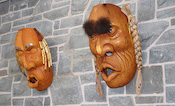 Stop #9: Indigenous masks & more at Weldon Law
Stop #9: Indigenous masks & more at Weldon Law
6061 University Avenue, second floor atrium
Created by artist Ned Bear, Sug-a-lug-betĚý(One Who Does Not Listen) and Kisu-westuĚýWon-nee-aah-kin (He Who Speaks from the Head) are Indigenous masks from the Dal Art Gallery permanent collection.Ěý
Other pieces found in the lobby and second floor atrium of the Weldon Law include:
- Plamu (bĂŞ-ka-mu) – SalmonĚýby Mark Sark (1963-2019)
- Matjoqtellgn (mat-chohk-te-ll-gĂŞn) – ArrowĚýby Mark Sark (1963-2019)
- UntitledĚýby Tayla Paul
On Dal News:ĚýIndigenous artwork illustrates diversity
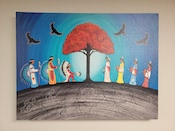 Stop #10: Collection at the Indigenous Student Centre
Stop #10: Collection at the Indigenous Student Centre
1321 Edward Street, throughout the first floor
Pieces designed by students, faculty, staff and Mi’kmaq artists are hung throughout the Indigenous Student Centre.
Ěý
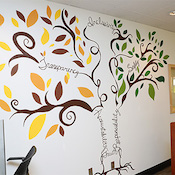 Stop #11: Mural in the Dentistry Student Lounge*
Stop #11: Mural in the Dentistry Student Lounge*
5981 University Avenue
By artist Tonya Sam’Gwan Paris, the mural is symbolic of a strengthened focus on reflecting and increasing the diversityĚýof the students in the Faculty.
On Dal News:ĚýRenewed Dentistry student lounge reflects a new focus on inclusion
*Not publicly accessible; a stop for students, faculty and staff in the Faculty of Dentistry.
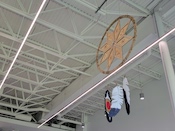 Stop #12: Peace Through Knowledge in the Richard Murray Design Building
Stop #12: Peace Through Knowledge in the Richard Murray Design Building
Morris Street,ĚýJohn Lindsay Sr. Design Commons, second floor
By artist Tonya Sam’Gwan Paris, the circle is symbolic of equality and signifies family ties, closeness and protection. One side is traditional (Mi’kmaw hieroglyphs) while the other features a Medicine Wheel.ĚýThe two Mi’kmaw starsĚýhold the names of 64 ancestors.Ěý
--
In Truro
Ěý
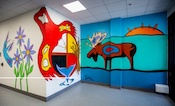 Stop #1: Campus mural inside the Cox Institute
Stop #1: Campus mural inside the Cox Institute
21 Cox Road
Designed by Mi'kmaw artist from Millbrook First Nation, Lorne Alexander Julien, the mural showcases elements of Indigenous culture including a medicine wheel, whale (putup), eagle (kiptu), hummingbird (militaw), and moose spirit (tiam), among other elements.
On Dal News: On Truro campus, vibrant new murals serve as a simple act of reconciliation
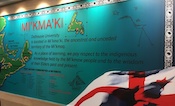 Stop #2: Campus mural in the Student Learning Commons
Stop #2: Campus mural in the Student Learning Commons
135 College Road
Created by local artist and previous Manager of Indigenous Students at Dal AC, Art Stevens, the mural marks the history of the Mi’Kmaq and acknowledges the campuses student diversity.
Read more: New Student Learning Commons a unique addition to Dal Ag Campus
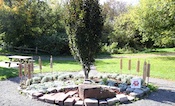 Stop #3: Mi’kmaw Lunar Cycle outside the Haley Institute
Stop #3: Mi’kmaw Lunar Cycle outside the Haley Institute
58 Sipu Awti
Based on a concept by Han Xie (Class of 2019) and configured and installed by Victoria Moffat (Class of 2022), this landscape installationĚýrepresents the Mi’kmaw lunar cycle and is organised to showcase educational knowledge of the 12 months and moons within the four seasons.
On Dal News: Landscape art installation at Dal shines a light on Mi'kmaw lunar cycle
--
In the master plan
The vision for ±«Óătv's physical spaces is layed out in ±«Óătv's Master Plan documents, and encourages creating and identifying opportunities for art.
On the Truro campus, art is often tied to the development of the Landscape Architecture program through garden walls, sculpture, kinetic sculpture, and environmental art through plant and tree species.
"It would be wonderful to get more pieces around campus. Art is integral to creating a climate of belonging," says Sherida Hassanali, assistant dean for equitiy, diversity, inclusion and accessibly in the Faculty of Engineering.
Collections on campus
The permanent collection contains over 1,400 works including contemporary and historical paintings, drawings, prints, sculpture, photography, mixed media works, and artifacts. These pieces are displayed through exhibitions at the gallery, across campus, or in the vault.Ěý
The exists as a way to place pieces in offices, meeting rooms, and public spaces such as libraries, learning commons, study spaces, and foyers.Ěý
“One of the reasons I got into curatorial practice was to support the work of artists from diverse communities and to recognize the importance of regional makers,” saysĚýPamela Edmonds, director and curator of the Dal Art Gallery.
"Over the next five years, it's a priority for me to add both Indigenous and African Nova Scotian pieces to our permanent collection."Ěý
Ěýwith questions about sourcing or commissioning a piece. Ěý

